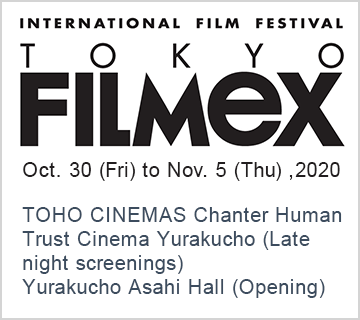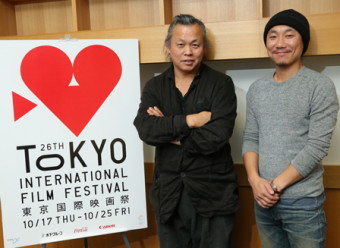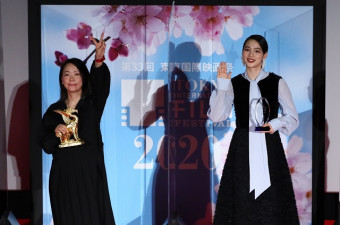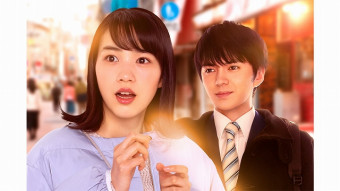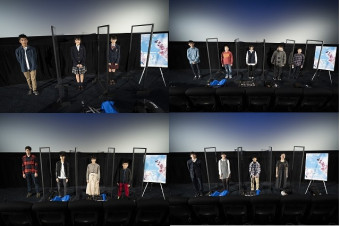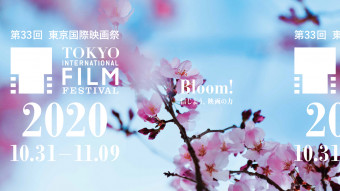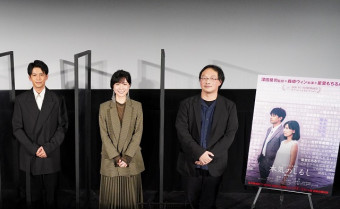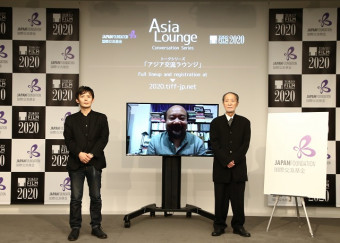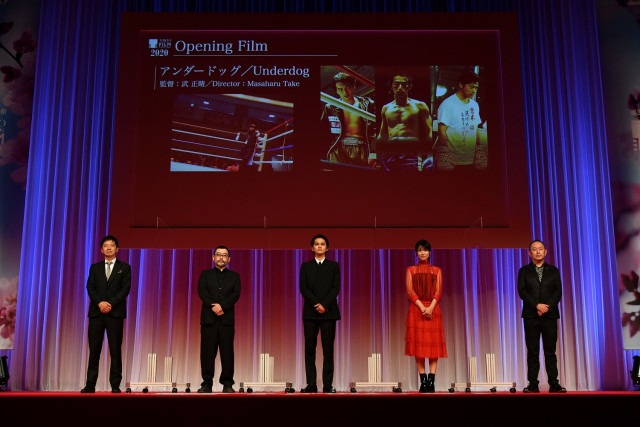
The 33rd Tokyo International Film Festival physically kicked off its 10-day run under crisp autumn skies on October 31, with an indoor Red Carpet event prior to the Opening Ceremony. With international travel restrictions still in place, the predominantly Japan-based filmmakers and stars appeared on a grand carpeted staircase at the International Forum in Hibiya.
Due to the pandemic, strict safety measures were in place at the forum, and these will also guide the physical screenings and Q&As to be held in TIFF’s regular venues in the Roppongi area. Some symposia and talks will take place online to accommodate filmmakers who are overseas. The festival will be screening over 100 films, including 32 titles selected for the special Tokyo Premiere 2020 section, making them eligible for the TIFF Audience Award.
Among the luminaries who walked the carpet were director Akiko Ohku, whose 2017 Tremble All You Want was the TIFF Audience Award winner. She appeared with the cast of her Tokyo Premiere 2020 title Hold Me Back and was asked how it felt to be back at TIFF. She responded, “I’ve been involved as a TIFF jury member and on the TIFF Youth team these past few years, but I always wanted to come back with my own film. I’m very honored to be here.”
This year’s Japan Now Director in Focus, Koji Fukada, appeared with stars of several of the nine films that will be screening in the section’s retrospective, including internationally acclaimed actress Mariko Tsutsui of Fukada’s Harmonium and A Girl Missing. Told that she was recognized as being the director’s muse, Tsutsui commented, “I have to thank Mr. Fukada for supporting me all these years. He creates an atmosphere that seems very safe and suddenly, there’s a huge hole in the ground and we fall in. He’s able to capture that and he has enormous talent. He’s really good at peeling off the mask of daily life and asking us whether we’re really paying attention.”
Actors Win Morisaki (Ready Player One), Kaho Tsuchimura and Kota Takahashi of the Cannes Premiere 2020-labeled The Real Thing were also on the carpet. Said Morisaki, attending his very first TIFF, thanked the organizers for holding the festival physically and giving him the opportunity. He added, “I have to warn you that the film is rather long. But once you get into it, I’m sure you’ll be drawn into the world of Mr. Fukada.”
Director Akio Fujimoto, the double winner of TIFF awards in 2018 with his Passage of Life, was back with his new Japan-Vietnam coproduction, Along the Sea, which had world premiered at the San Sebastian Film Festival. Asked if he would continue telling stories about immigrants in Japan, Fujimoto said, “Connecting with non-Japanese who live here is really not just a theme, it’s my life’s work. So I will continue making films about them.”
Malaysian director Edmund Yeo, winner of the TIFF Best Director Award in 2017 with Aqerat, appeared on the carpet after a two-week quarantine, along with Japanese members of the filmmaking team behind his Tokyo Premiere 2020 title Malu, which was partially shot in Japan. Asked how he felt, he responded, “Thank you for having me here again. TIFF feels like my home festival. It was 10 years ago that my first short film was shown here. I’m very happy that, despite this challenging time, TIFF is happening — it’s really an inspiration to filmmakers. So I had to be here.”
Other major guests included the stars of Special Screenings selection Food Luck, Tao Tsuchiya and Exile Naoto; and actress Makiko Watanabe, who appears in Lim Kah Wai’s Tokyo Premiere 2020 selection Come and Go. Lim had also self-quarantined for two weeks, since he had returned home to Malaysia due to the pandemic. Watanabe mentioned that she’d met him when he was a TIFF juror. As a director, “Lim is always cheerful and excited, a unique person that I really enjoyed working with.”
Hajime Hashimoto, director of TIFF Closing Film Hokusai, appeared with screenwriter-actress Ren Kawahara, who commented, “Hokusai is probably Japan’s most famous artist and there hasn’t been an autobiographical film yet. I wanted to depict his youth and his old age, since he reached his peak years in his 70s.” Asked about the casting of Yuya Yagira and Min Tanaka in the role, Hashimoto said, “Both actors have amazing eyes. You could see the whole story just by looking at their eyes.”
The Opening Ceremony then began with a spirited live performance by the Film Score Philharmonic Orchestra, playing a compendium of familiar themes songs from some of the world’s most beloved films.
TIFF Festival Chairman Hiroyasu Ando welcomed the audience from the stage, noting, “Since spring, we’ve been contemplating whether or not to hold the festival due to the pandemic. I’m deeply moved to see so many of you here today for our Opening Ceremony.” He mentioned the three 4K remastered films by Sadao Yamanaka that the festival would be screening. “Mr. Yamanaka went to war, but he always stayed passionate about films, until the moment he died on the battlefield. His work inspired the likes of Yasujiro Ozu. We believe in the power of films, even in this difficult time, and wanted to keep the beacon of film lit by holding the festival physically.” He then declared the festival officially open.
After introducing all the filmmakers and stars who had just appeared on the Red Carpet, a series of congratulatory videos were shown, starting with Hiroshi Kajiyama, Minister of Economy, Trade and Industry, who mentioned that, despite the pandemic, such films as Today It’s My Turn had been able to open in theaters and to become a major hit in Japan, stressing the resilience of the film industry and the audience’s devotion to cinema.
Christopher Nolan also offered congratulations via video, and commented, “The fact that in these challenging times you’ve found a way to honor and enjoy watching films on the big screen is a source of inspiration to myself and other filmmakers around the world. And excitement around cinema and maintaining the excitement around the big screen experience not just for fans of movies in Japan but for all film lovers all over the world is extremely exciting.”
Thai auteur Apichatpong Weerasethakul, who will be appearing online in TIFF’s new Asia Lounge Conversation Series, had this to say via video: “I’m really happy we are here for this important event. Hopefully, in not too long we can we meet again for real and we will treasure being around strangers in the dark, seeing moving images together. But meanwhile we have to support our film industry. I congratulate you, Tokyo International Film Festival, for your 33rd birthday and for your dedication to make this edition happen and to continue.”
Also on video, Thierry Frémaux, director of the Cannes Film Festival and the Lumière Film Festival, noted that 2020 marks the 125th anniversary of the birth of cinema and movie theaters. “This has been a difficult year for everyone,” he said. “However, organizing a film festival is a way to fight against those difficulties. People are making films all over the world, hoping that they would be shown and seen by the public. Encouraging the professionals also encourages the audience. It’s fantastic that the Tokyo International Film Festival is taking place. The cinema still has a great future, thanks to the organizers of the festival, the artists and the audience.”
Finally, Robert De Niro appeared via video, and said, “We hope that [TIFF] will be a big, big success and we know that it will be. Omedeto gozaimasu!”
Festival Ambassador Koji Yakusho, the internationally acclaimed actor of such films as Shall We Dance and Hirokazu Kore-eda’s The Third Murder, then took to the stage, where he was congratulated for his recent win at the Chicago International Film Festival as Best Actor for Under the Open Sky by Miwa Nishikawa. Joking that he wished he could be as brief as De Niro, he said:” I know that this festival will be quite different from all the others. We must all take precautions, but I think we can still have a really good time. It’s wonderful to be able to see all the films on the big screen. We don’t know what will happen in the future, but we should all try very hard to sustain film.”
He concluded, “I’ve been watching movies in theaters since I was a little kid. I think subconsciously I’ve learned so much from movies, not only about film but every other art, since they are all part of the art of cinema. Certain films, like documentaries, can change the times. I think the power of film is enormous. [As for the Audience Award] that will be selected this year, I think it’s a really good thing to involve audiences in the important decision.”
The Japan Now Director in Focus Koji Fukada, a Cannes prizewinner, was brought to the stage with two of the stars of films that will be showcased in the section, actors Mariko Tsutsui (Harmonium, A Girl Missing) and Win Morisaki (The Real Thing). The director noted that it had been a decade since TIFF had given him his first major award, for Hospitalité, and that he saw the honor as “a strong message that I should continue to make films. I’m hoping this will provide an opportunity to people who’ve never seen my films to come and watch them.”
Morisaki said, “My role is a guy who doesn’t have any empathy, and I struggled a bit to understand him. But through discussions with Mr. Fukada, I became mesmerized by the magic of his world. Before I realized it, I had become my character.”
Tsutsui was congratulated for her recent award from the Japanese government for her role in A Girl Missing. “But sadly, due to the coronavirus, there was no award ceremony, and I received my certificate at home through a courier service.”
At the completion of the Opening Ceremony, director Masaharu Take, screenwriter Shin Adachi and producer Gen Sato of TIFF Opening Film Underdog took to the stage with stars Takumi Kitamura and Kumi Takeuchi. Star Mirai Moriyama appeared on video behind them from Osaka, where he’s currently performing on stage. He recalled first receiving the script and realizing that “My character doesn’t speak much. Mr. Adachi’s screenplay just had dots for places he should have spoken. But he does emote in the ring, and I could express my emotions and character through boxing.”
Rising star Kitamura said, “Mr. Take is so intoxicated by film, and he shared so many things with us on set. He’s obsessed, maybe even possessed, but he gave all of us motivation.”
Moriyama concurred. “He was always the first one on set, he has so much energy, he’s at the center of the shoot, he has the loudest voice and he really made it energizing and exciting for all of us to be there.”
Take (Netflix’s The Naked Director), Adachi (A Beloved Wife) and Sato had all collaborated on the 2014 TIFF award winner 100 Yen Love, and they’ve now reunited for another boxing story. “Boxing films are really difficult to make,” said Take, “and I know it wasn’t easy for the actors. I was blessed by these wonderful actors. We filmed in January and February this year, and it’s being released in 2020, so I think [with the Covid-19] situation, it gave a greater sense of accomplishment.”
The 276-minute-long, two-part Underdog focuses on Akira (Moriyama of Samurai Marathon, Rage), who was once ranked No. 1 in Japan’s featherweight division, but has seen his fortunes dwindle as he approaches middle age. In the first half, his opponent is a failing comedian with father issues, Shun (Ryo Katsuji of Masquerade Hotel), who sets up an exhibition match with Akira for a TV sketch show. In the second half, Akira is challenged by Ryuta (Kitamura of 12 Suicidal Teens), a new father who has KO’ed all his previous opponents and has always admired Akira.
The Tokyo International Film Festival will be showcasing films from around the world at Roppongi Hills from October 31 – November 9.






